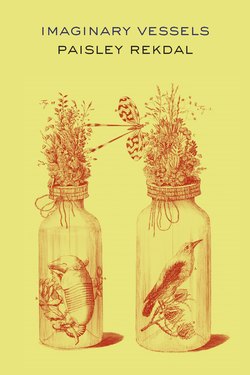Читать книгу Imaginary Vessels - Paisley Rekdal - Страница 9
ОглавлениеBUBBLES
The child purses his lips around a hole. Blows
and out the radiant world swells forth.
The park swings bend. His mother’s face shrinks
to the size of a bubble. I sit across from them,
on my separate bench, bobbing past in its reflection.
It’s my gift, this vial of soap.
I bow my dark head low as my friend’s son
pats my cheeks in thanks, obediently
sucks in another breath
and blows.
“Any fool can make soap;
it takes a clever man to sell it.”
So Thomas Barratt, 1880, said, and pursued Millais
to paint Pears’ advertising: an English painter
for an English soap. “Of two countries
with an equal weight of population,” he wrote,
“the most highly civilized will consume
the greatest weight of soap.” A quote
from my scholar friend in her book
on bubbles that she’s given me: my gift
of this toy a nod to her descriptions
of palm oils rendered in chains
of vats, thickened with the meat
of African coconuts.
Through a stream of bubbles,
I watch her wipe her son’s streaked face, recall
my washing machine at home which has a setting
labeled Baby Clothes. The store model
wore a pink-and-blue sign reading,
Don’t You Want One? I think
of the painting on her book’s cover, Newton’s
Discovery of the Refraction of Light: a thin-faced scientist slumped
in dark, while his nephew, by a bank of windows,
blows bubbles. On Newton’s side of the canvas:
a dusty globe, a world of shadows
that dissolves beside the child
in play, revealing how the sun refracts the panes
the maid will have to scrub. In the image,
she turns her head away, the sun
begun to bore into her eyes. And here’s a bore of sun
illuminating the bubble’s flaw that stuns the child
now blowing in the park, learning the tensile skins
can’t withstand the pressure
of a touch. “They don’t last!” he shrieks
as his mother hugs him, a squalling
aggregate of cells neither of us can hush. Of cells,
I also thought an aggravate. “Make this the sweetest
picture postcard yet,” Barratt begged Millais. And so
the painter drew a Pre-Raphaelite child at play
blinking at the globe he’s made, a lens of clean in which
the thin white etch of him sails past
in dark, the milk-white cheek, the booted
foot: the boy’s blue eyes turned in rapture to what
a parent’s invention makes. A Child’s World,
Millais titled it, but Barratt
stuck a bar of Pears in it and turned
the painting into posters, puzzles, postcards
shipped along with images of English flags
and Maori girls, kaleidoscopic
slow flash photos of bursting
bullets, their shock waves caught and used to improve
British rifle manufacturing.
“We have a perfect right
to take toys and make them into philosophy,”
my friend’s book quotes. “Inasmuch as we have turned
philosophy into toys.”
Look: a bubble of black
wobbles and bursts: explodes the world
to a slick of oil.
The clouds pull back. The boy, damp faced from his fit,
now sleeps. Sunlight holds, refracts him in his nap
as something in my friend’s face
cracks. It wildly opens.
Don’t you want one? something whispers. Don’t you, really?
Last night’s thinnest edge
of dream still wavers, the one where the doctor tells me
I am carrying, but will not tell me what
or when. Black hope rises,
bursts inside me. “It’s an aggravate of sells,” he says—
The world grows thin. My friend packs up the toys and kit,
tapping at her soapy vial.
She shakes up the foam and sticks in the pipe.
A world blows up.
The mother and child float by in it.
